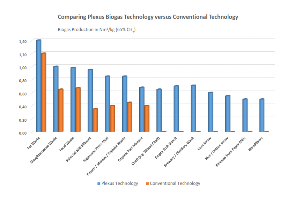Extracting energy from industrial waste, and not from agricultural crops.
English
Our Goal.....
Extracting energy from industrial waste that contains a substantial amount of organic material; Waste streams that currently contain an unused amount of energy, which are now being destroyed as waste. The Reason is: Applied technology can't handle it.
How?
By fermentation, using a sophisticated fermentation technology,
for example, biogenic waste streams from paper mills
) are processed.
What is being produced?
A high-quality biogas based on 65% Methane (CH4)
How can this biogas be used?
The biogas can be converted into biogenic natural gas and fed into a (natural) gas network.
Why biogas?
Given the consequences of the current crisis situation, it is beyond words that we are confronted with absurd energy prices.
Are we really prepared to accept this, while the technology and the raw materials that presently end up in our garbage cans, are available for a natural gas alternative.
One big advantage: This clean form of energy can be delevered efficiently where necessary.
In the Netherlands we have an excellent
infrastructure and network for
natural gas, that can be used for the delivery of biogas.
Is this rocket-science?
We provide a proven technology based on:
- An efficient fermentation technology.
- The correct bacterial culture.
- And optimum operation of the installation.
Has your interest been aroused??? Read more........
The efficiency at which solar, wind and biomass are converted into energy is far from optimal. We have to face the challenge.
There is still a great business potential in the field of bio-fermentation. Plexus Energy has mainly focused on the efficiency of fermentation processes of hydraulic digesters. We have come to the conclusion that only a fraction of the enclosed energy is extracted in the majority of existing bio digesters.
This is partly the reason why bio digesters were labelled "Inefficient", and why these techniques were increasingly pushed aside.
In focus of the current crisis situation regarding gas supplies, politicians are once again getting attention for bioenergy; The theme "Green Gas" is currently high on the political agenda.
It should also be noted that alternatives such as hydrogen and nuclear energy still require a lot of development; It will take years before these hydrogen and accepted nuclear techniques are ready for the market.
If we really want to secure the energy supply and move towards a cleaner environment and reduce CO2 emissions, then in the near future we will have to supply the lion's share of our daily energy needs as much as possible from available sustainable energy sources such as solar, wind and in our opinion preferably biomass. These techniques are "proven".
Besides their advantages, the sun and wind options also have the obvious disadvantages of not functioning when it is dark or when there is no wind. Disadvantages beyond human control.
Even if we were to produce an oversupply of wind and solar energy, this overproduction cannot be stored without a huge energy loss. Solar and wind must therefore be supported by a reliable energy buffer, so that the supply of electricity is guaranteed 100%.
Supply and demand of electricity, exclusively using wind and solar energy, can never be matched. Assuming we want to avoid blackouts, and loss of heating; No one wants to sit in the dark or in the cold.
In the future, the demand for electricity will only increase. For example due to the increase in the number of electric cars.
Note: Overproduction of electricity: Supply and demand of electricity is equal. No more electrical energy is consumed than required. What do you do with the surplus energy production? Electricity cannot be stored without a huge energy loss. In practice, this superfluous energy will usually have to be regarded as lost. Producing hydrogen is easier said than done! Any form of energy conversion consumes enormous amounts of energy. Even in hydrogen production.
Experts in Renewable Energy
